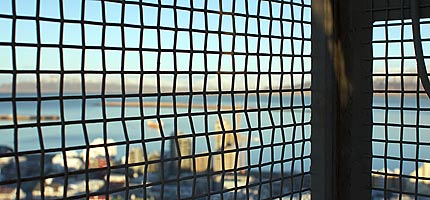© Árni Svanur Daníelsson / Biskupsstofa
Iceland: Financial Meltdown and Moral Recovery
His steps are heavy. A man in his forties, a contractor in the building industry who has been unemployed for months; he is out of work for the first time in his life. He has already tried everything to cope. “I never thought I would need to ask for help to feed my family,” he says.
Asking for help is a last resort for those who fall through the grid of social support in Iceland.
Since October 2008, the country has been ravaged by the global credit crisis. The currency collapsed. The economy contracted, with unemployment rising rapidly. The government was forced to take control of the three major banks and eventually to resign.
Requests for help to Icelandic Church Aid (ICA) have grown more than 300 percent. Most who come have never sought help before. Many break down.
“Unemployment is the biggest single factor,” says Vilborg Oddsdottir, a social worker at the ICA. “In April 2008 we had requests from four unemployed men. In March 2009 we had requests from 46 women and 213 men.”
Congregations and deaneries around the country have stepped up their contributions to the ICA, as have the church authorities. Jonas Thorisson, director of the ICA, says that donations for domestic aid have never been higher. “But the need is increasing, both in the capital and around the country, where the pastors are our contacts for assistance.”
In Reykjavík, the Red Cross opened a center for the unemployed. Pastors and deacons volunteer every day and offer pastoral counseling. In other areas, congregations have opened centers.
Iceland had enjoyed years of rising incomes and high growth rates, thanks in no small part to a foreign debt that peaked at 10 times the annual national GDP. For just that reason, the country was hard hit by the global financial meltdown.
In the population of 320,000, the sense of insecurity, anger and disbelief is strong. As evidence surfaces of excessive risk taking and mismanagement by financial institutions, many question the moral foundations of the economic boom. Why was the nation so taken up with material success and financial gain?
Pastors see the change in the nation’s mood in increased church attendance, especially in Sunday schools and meetings for parents with young children. It is a time of sober reflection.
In a radio sermon encouraging the nation to look after those most affected, Karl Sigurbjornsson, the bishop of Iceland, said, “Now is the time to show care and support for each other and look to our best values. The funds we have in spiritual and moral treasures—care, love, faith and prayer—are strong and last when others fail.” Bishop Karl also stresses the importance of honoring commitments abroad, especially in development work.
While many families are hard hit, the crisis also brings out the best in many Icelanders who take up the bishop’s call, volunteering to work for aid organizations and making donations where they can.
Work, home, security—everything that was taken for granted is now a cause for gratitude and a grace to be shared.

